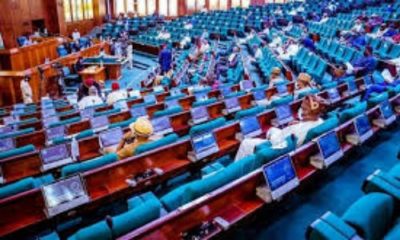Health
NAFDAC Issues Public Alert On Fake Antibiotics In Circulation
The National Agency for Food and Drug Administration and Control (NAFDAC) has raised an alarm over the discovery of counterfeit OHEAL Ampicillin and Cloxacillin Capsules in Onitsha, Anambra State.
Working closely with the Nigeria Police Force, NAFDAC intercepted the falsified drugs, which are typically used to treat bacterial infections affecting the lungs, throat, airways, and skin.
In a statement posted on its official Twitter handle, NAFDAC explained that genuine Ampicillin/Cloxacillin functions by inhibiting bacterial growth and effectively eliminating infection-causing bacteria.
While the counterfeit product was identified in Onitsha, there is concern it may have already entered other parts of the country through informal markets.
NAFDAC stressed the urgent need to identify and remove these falsified drugs from circulation to safeguard public health.
“Though this falsified product was identified in Onitsha, it may likely have been distributed to other parts of the country through informal markets. Consequently, it is important to identify and remove it from circulation to prevent harm to patients,” NAFDAC said.
Importers, distributors, retailers, and healthcare providers have been urged to exercise heightened caution and vigilance throughout the supply chain to prevent the importation, distribution, sale, and use of counterfeit or substandard medicinal products.
NAFDAC emphasized the importance of sourcing all medical products exclusively from authorized and licensed suppliers, with careful verification of product authenticity and condition.
Members of the public who have purchased the falsified OHEAL Ampicillin and Cloxacillin Capsules are advised to immediately cease use and contact NAFDAC for proper handling of their stock.
Health
Nigeria Strengthens Airport Screenings Amid Spread Of China’s HMPV Virus

The Nigerian government has increased surveillance at major international airports in response to the outbreak of Human Metapneumovirus (HMPV), recently discovered in China and now spreading to several countries, including India, Hong Kong, Malaysia, and Kazakhstan.
Port health officers have begun screening arriving passengers for symptoms of the virus, following a directive from the Minister of Health, Muhammad Ali Pate.
According to a source at Murtala Muhammad International Airport (MMIA), Lagos, “There is no cause for alarm as the Port Health Service has been mandated to start screening the passengers, and we are not taking anything to chance.”
The Human Metapneumovirus has sparked global concern after over 5,000 hospitalisations were reported in the United Kingdom due to respiratory infections linked to the virus.
READ MORE: Speed Darlington Sues IGP For N300M Over Unlawful Detention
The Nigeria Centre for Disease Control and Prevention (NCDC) has issued an advisory to monitor global developments in collaboration with the Ministry of Health and Social Welfare. Dr Jide Idris, Director-General of the NCDC, stated, “We aim to provide timely, accurate information and guidance to keep the Nigerian public informed and prepared.”
The agency also debunked rumours that the World Health Organization (WHO) had declared HMPV a Public Health Emergency of International Concern (PHEIC), urging the public to disregard such claims.
Screenings have commenced at key airports, including MMIA, Lagos, and Nnamdi Azikiwe International Airport, Abuja. Despite the heightened precautions, the Nigeria Civil Aviation Authority (NCAA) has yet to issue a formal circular to airlines on mandatory passenger checks.
The surge in respiratory infections globally has heightened pressure on health systems. In the UK alone, flu cases rose sharply over the holiday period, with over 5,000 hospitalisations reported by December 29, 2024. There has also been an increase in hospitalisations linked to COVID-19, norovirus, and RSV.
As global temperatures drop and respiratory infections continue to rise, Nigerian authorities remain vigilant, aiming to prevent the spread of HMPV within the country.
Health
Africa Leads Global Progress In HIV/AIDS Fight, Says WHO
Africa has made remarkable progress in reducing new HIV infections and AIDS-related deaths, according to the World Health Organization (WHO).
Dr. Matshidiso Moeti, WHO Regional Director for Africa, highlighted these achievements in her statement to mark this year’s World AIDS Day, themed “Take the Rights Path: My Health, My Right” on Friday.
READ ALSO: Atiku Gloats Over AUN’s Achievements Ahead Of 20th Anniversary
For the first time in 2023, the number of new HIV infections outside sub-Saharan Africa surpassed those within the region, underscoring Africa’s significant progress.
The continent is also a global leader in advancing the 95-95-95 UNAIDS targets aimed at ensuring 95% of people living with HIV know their status, 95% of those diagnosed are on treatment, and 95% of those treated achieve viral suppression.
“Seven countries have already achieved the targets, with the overall rating for the region currently at 90-82-76,” said Dr. Moeti. “About 21.3 million people are now on antiretroviral treatment, raising their life expectancy.”
Botswana and Namibia were recognized for achieving significant milestones in preventing mother-to-child HIV transmission, earning silver and bronze tier statuses, respectively, under WHO’s Path to Elimination of HIV initiative.
African countries are also adopting innovative prevention methods, including oral and long-acting injectable pre-exposure prophylaxis (PrEP) and the dipivefrine vaginal ring.
Dr. Moeti stressed that while these tools are vital, their impact depends on accessibility.
“The value of these innovations depends on their universal accessibility,” she stated, emphasizing the need for investments and policy reforms.
Dr. Moeti called for an end to stigma and discrimination, which she said continue to hinder progress.
“We have a collective obligation to protect human rights, specifically ensuring that health care is available to everyone, without any discrimination, regardless of their HIV status, background, gender, or where they live. Stigma and discrimination cannot be allowed to undermine the gains and impede our progress.”
While celebrating these advancements, Dr. Moeti noted that disease outbreaks across the region pose a challenge to already overburdened health systems.
She emphasized the importance of strong, integrated, and person-centered health care systems to meet the needs of vulnerable populations.
“Let’s take this opportunity today to acknowledge the progress, but to also renew our joint commitment to eliminating HIV.
By protecting everyone’s right to health, and reducing new HIV infections, we can achieve an AIDS-free generation and ensure the sustainability of the HIV response,” she urged.
Dr. Moeti also highlighted the crucial role of communities in shaping strategies to eliminate barriers to care.
“We must ensure their voices are heard,” she said, emphasizing that the collective efforts of governments, partners, civil society, health care providers, and communities are essential in the fight against HIV/AIDS.
Health
NTDs: Nigeria Needs $19m To Combat Health Crisis, Officials Warn
Nigeria requires an estimated $19 million to effectively combat Neglected Tropical Diseases (NTDs), according to Fatai Oyediran, the National Coordinator for NTDs at the Federal Ministry of Health and Social Welfare.
Speaking at a high-level advocacy meeting in Abuja on Thursday, Oyediran highlighted the urgent need for funding to support the country’s NTD control efforts.
“We developed our NTD master plan in 2023, which runs through 2027, and $19 million is what we need to implement it effectively,” Oyediran stated, emphasizing that adequate investment is crucial to addressing these diseases, which continue to affect millions in Nigeria.
READ ALSO: UK Opens Africa’s Largest Visa Application Centre In Lagos
The World Health Organisation defines NTDs as a diverse group of diseases caused by viruses, bacteria, parasites, fungi, and toxins, often leading to devastating health, social, and economic consequences.
These diseases primarily affect impoverished communities in tropical areas and are estimated to impact over one billion people globally.
In Nigeria, NTDs are responsible for a significant portion of the continent’s health burden, with the country contributing to 50% of Africa’s NTD cases and 25% of the global total.
Oyediran underscored the need for a united approach to secure funding and mobilize resources for Nigeria’s NTD control programs.
“One major challenge in addressing NTDs has been inadequate funding. There are about 21 diseases grouped under NTDs; each of them has its own peculiarities. Adequate funding is essential to effectively implementing all the strategies of controlling NTDs,” he explained.
The National Coordinator also called on both federal and state governments to allocate specific budgetary provisions for NTDs.
“Most states currently lack budgetary provisions for these diseases, and this is why we are engaging with health commissioners today. They are expected to communicate with their governors and ministries of budget and planning to establish a dedicated budget line for NTDs,” he said.
Stuart Halford, Director of Advocacy and Resource Mobilisation at United to Combat NTDs, echoed Oyediran’s call for funding, emphasizing that eliminating NTDs should be prioritized due to their severe economic impact.
“There are many health priorities, but eliminating NTDs is equally important because they contribute to economic and productivity losses,” Halford said.
Progress is being made in some states, such as Abia, where NTDs like onchocerciasis and lymphatic filariasis have been largely controlled.
Abia State Health Commissioner, Prof. Enoch Uche, revealed that the state was certified in 2022 for breaking the transmission of onchocerciasis and lymphatic filariasis.
“We began mass administration of drugs as a form of preventive measure, which lasted for 10 years. In 2022, Abia state was certified to have broken the transmission of onchocerciasis and lymphatic filariasis,” he said.
Kwara State has also made strides in the fight against NTDs.
The state’s Health Commissioner, Amina El-Imam, noted that Kwara has successfully eradicated lymphatic filariasis and onchocerciasis, despite the many other health challenges the state faces.
“NTDs are so-called because they have not received appropriate attention and funding over the past years. Unless we refocus on them, we will not be able to achieve eradication as intended,” she warned.




















